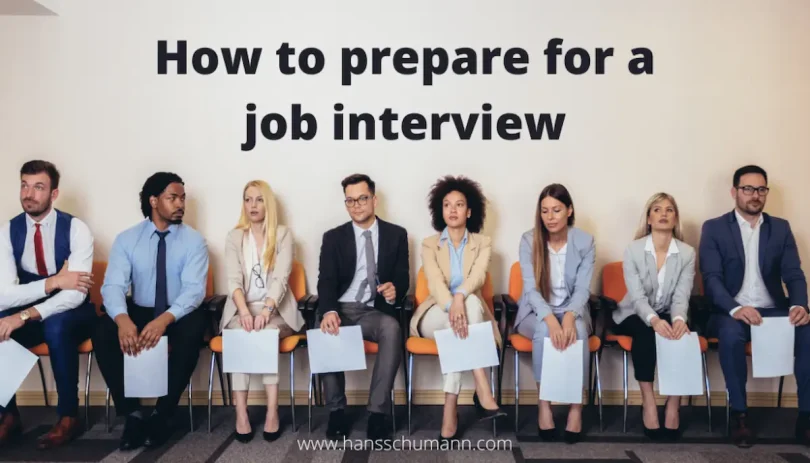Are you thinking about how to prepare for job interviews and feeling a bit nervous? That’s completely normal—interviews can be intimidating, especially if it’s your first one or for your dream job. The good news is that with proper preparation, you can walk in with confidence and leave a strong impression.
In this detailed guide, we’ll take you through every step to ensure you’re fully ready to tackle any interview.
1. Research the Company Thoroughly

Understanding the company is the foundation of interview preparation. Start by gathering information about:
- Company mission and values: Knowing what the company stands for allows you to align your answers with their culture.
- Products or services: Understand what they offer and who their target audience is.
- Recent news or achievements: Highlighting these in your answers shows you’ve done your homework.
- Company culture: Check their social media or employee reviews to get a feel for work environment.
Pro Tip: Take notes while researching and use key points in your answers. For example, “I admire your company’s commitment to sustainability, which aligns with my values and previous work experience in eco-friendly projects.”
2. Understand the Job Role
Knowing the job description inside out is crucial. Here’s how to approach it:
- Break down the responsibilities listed in the job posting.
- Identify the skills and qualifications the employer is seeking.
- Match these requirements with your experiences. Think of examples where you demonstrated these skills successfully.
Behavioral Preparation: Use the STAR method (Situation, Task, Action, Result) to structure answers for questions like:
- “Tell me about a time you handled a difficult situation.”
- “Describe a project you successfully completed under a tight deadline.”
3. Prepare for Common Interview Questions
Some questions appear in almost every interview. Practicing these will boost your confidence:
- Introduce yourself: Keep it concise and focus on your professional achievements and relevant experiences.
- Why do you want this job?: Mention the company’s values, your career goals, and how you can contribute.
- Strengths and weaknesses: Be honest but strategic; highlight a weakness you’re actively improving.
- Career goals: Show ambition but remain realistic.
Pro Tip: Practice out loud or with a friend. This helps with fluency and reduces filler words like “um” and “uh.”
4. Dress Professionally

Your appearance is the first impression. Here’s what to consider:
- Choose attire that matches the company culture (formal for corporate, smart casual for startups).
- Ensure your clothes are clean, well-fitted, and ironed.
- For virtual interviews, dressing fully—even if only the top is visible—improves confidence.
Pro Tip: Stick to neutral colors like black, navy, or grey for formal interviews and avoid flashy accessories.
5. Perfect Your Body Language
Non-verbal cues are as important as what you say. Keep these in mind:
- Maintain good posture—sit straight, not slouched.
- Keep eye contact to show attentiveness.
- Smile genuinely when appropriate.
- Avoid crossing your arms or fidgeting, which can make you appear closed off.
Pro Tip: Practice body language in front of a mirror or record yourself to evaluate your gestures and expressions.
6. Prepare Thoughtful Questions to Ask
Interviewers often ask, “Do you have any questions for us?” Always be ready. Thoughtful questions show interest and engagement:
- “What does a typical day look like for this role?”
- “What qualities make someone successful in this position?”
- “What are the opportunities for growth and development?”
- “Can you describe the team I’d be working with?”
Pro Tip: Avoid asking questions about salary or benefits in the first round unless the interviewer brings it up.
You may also like to read this:
Easy Steps on How To Choose The Right Career Path
Best Jobs For Fresh Graduates: Top Career Options
Best Career Planning Tips For Students To Follow
Future Career Options After School | Complete Guide
7. Practice Mock Interviews
Simulating real interviews reduces anxiety and improves performance:
- Ask a friend, mentor, or career coach to conduct a mock interview.
- Practice both technical and behavioral questions.
- Get feedback on your answers, tone, and body language.
Pro Tip: Treat mock interviews as seriously as real ones—dress professionally and answer questions thoughtfully.
8. Organize Your Documents
Having your documents ready ensures a smooth interview:
- Multiple copies of your resume.
- List of references with contact details.
- Certificates or portfolio items, if relevant.
- For online interviews, make sure your files are accessible and organized on your device.
Pro Tip: Keep a notebook and pen ready to jot down important points during the interview.
9. Manage Stress and Stay Positive
Nerves are normal, but don’t let them take control:
- Practice deep breathing or mindfulness exercises.
- Exercise or take a walk to release tension.
- Visualize success and remind yourself of your skills and achievements.
Pro Tip: Listen carefully during the interview and pause before answering if you need a moment to think—it’s better than rushing a weak answer.
10. Follow Up After the Interview
A follow-up can make a big difference:
- Send a polite thank-you email within 24 hours.
- Mention a specific part of the interview that you found interesting.
- Reaffirm your enthusiasm for the role.
Example: “Thank you for taking the time to speak with me today. I really enjoyed learning more about your team and projects. I am excited about the opportunity to contribute my skills to [Company Name].”
Final Thoughts
Knowing how to prepare for job interviews isn’t just about memorizing answers—it’s about building confidence, demonstrating your skills, and showing genuine interest in the company. With research, practice, and preparation, you can turn interview anxiety into an opportunity to shine.
Remember, each interview is also a chance for you to evaluate if the company aligns with your career goals. Be authentic, stay positive, and approach every interview as a learning experience.
FAQs
1. What is the first step in preparing for a job interview?
The first step is researching the company. Learn about its mission, values, products, services, and culture. This helps you tailor your answers and show genuine interest in the organization.
2. How can I practice for common interview questions?
Make a list of frequently asked questions like “Tell me about yourself,” “Why do you want this job?” and “What are your strengths and weaknesses?” Practice answering them out loud, use the STAR method for behavioral questions, and consider mock interviews with friends or mentors.
3. How should I dress for an interview?
Dress professionally according to the company’s culture. For corporate jobs, formal attire is best. For startups or creative roles, smart casual is usually acceptable. Always ensure your clothes are clean, neat, and well-fitted.
4. What are the best ways to handle interview anxiety?
To manage stress, practice deep breathing, meditation, or light exercise before the interview. Visualize a successful outcome and remind yourself of your achievements. Preparing thoroughly also helps reduce anxiety.
5. Should I prepare questions to ask the interviewer?
Yes! Always prepare thoughtful questions like “What does a typical day look like?” or “What qualities make someone successful in this role?” This demonstrates your interest and engagement.






